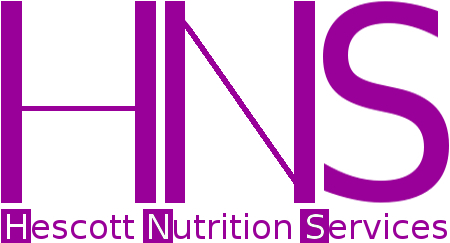.
Welcome to my blog!
.
The Science of Hunger, Appetite, and Cravings: Unveiling the Culinary Desires Within Us
By Hescott Nutrition Services | posted in October 2023 | Hunger, Appetite, Cravings, Food Euphoria, Food Craving, Lack of Sleep, Feeling Stressed, Balance Meals, Limit Evironmental Cues, Get Quality Sleep, Drink Water, Make Nutritious Snacks Convenient, Be More Mindful.

The complex and multifaceted relationship between our bodies and the food we consume is a fundamental aspect of human existence. We've all experienced the sensations of hunger, appetite, and the powerful urge of a food craving, but seldom do we pause to contemplate the intricate interplay of physiological and psychological forces that drive these feelings. Hunger, as a primal and universal signal, alerts us to the need for nourishment when our stomachs are empty. Appetite, on the other hand, represents the more nuanced desire to eat, influenced by factors such as sensory appeal, cultural cues, and personal preferences. Yet, it's cravings that often perplex us the most, standing apart as a distinct experience driven by a unique set of mechanisms that can leave us yearning for a specific food, even when our stomachs are full. In this exploration, we embark on a journey to unravel the mysteries of these culinary desires, from their physiological underpinnings to their emotional and psychological dimensions, shedding light on the intricate world of human appetite.
According to Harvard Health, cravings are characterized as "a strong and immediate desire to consume a particular food." Unlike hunger, which can be satisfied by consuming any type of food, cravings are highly specific, often honing in on a single food item, such as the ever-popular craving for chocolate. Furthermore, cravings have the tendency to strike unexpectedly; they can materialize even when we've recently enjoyed a satisfying dinner and have no genuine hunger.
Food cravings often exhibit specificity, typically targeting sweet, salty, or fatty foods. Contrary to the common notion that cravings arise solely from a "sweet tooth," indulgence in easily accessible crave-worthy foods, or a lack of behavioral control, there are also numerous intricate and prevalent physiological factors behind these cravings. Many of these factors are deeply ingrained in our neural circuitry and naturally influenced by hormones and various neurotransmitters.
Fun fact: Research shows that nutrient or energy deficiencies are not powerful or common causes of food cravings.
We'll start with the top four causes, according to the Cleveland Clinic: food euphoria, feeling stressed, lack of sleep, and day-to-day habits.
Food euphoria occurs when the food we consume activates the intrinsic "feel-good" centers within the brain's neurons. Beyond triggering the release of the "feel-good" neurotransmitter dopamine, highly desirable foods also prompt the secretion of hormones that influence metabolism, stress responses, and appetite regulation. This sense of euphoria resembles a delightful reward, naturally fueling our desire to consume more of that specific food, thus generating even more cravings for it.
Feeling stressed can significantly intensify our food cravings, particularly when that stress persists over an extended period. Elevated levels of stress hormones, such as cortisol, activate our "fight or flight" instincts, compelling us to seek food as a source of energy for potential survival scenarios. Consuming the craved food temporarily alleviates this stress and assists us in dealing with, or even momentarily diverting our focus from, the distressing emotions.
Lack of sleep can intensify cravings through its influence on our hormones. Inadequate sleep, for instance, places added stress on our bodies, which in turn amplifies our inclinations for specific foods. Sleep deprivation can trigger hunger by boosting the hunger hormone ghrelin while simultaneously reducing the fullness hormone leptin.
Day-to-day habits may also have a role in triggering cravings. If we're accustomed to indulging in snacks when we experience specific emotions, such as stress or fatigue or engage in particular activities, like driving, browsing social media, or watching TV, these habits can perpetuate our cravings, leading us to automatically reach for desired foods before conscious thought kicks in.
Beyond these four causes of food cravings, various other factors may contribute. For instance, cravings can be sparked by the sight or scent of enticing foods, as well as hormonal fluctuations associated with the menstrual cycle. Certain medications are known to increase appetite. Moreover, ongoing research is investigating potential links between food cravings, our genetic makeup, and gut microbiota.
Curbing Your Food Cravings

It's important not to restrict ourselves from eating when we genuinely feel hungry. Nevertheless, there might be occasions when we're yearning for something we're aware isn't good for our well-being or doesn't align with our dietary goals. In such situations, there are several strategies you can experiment with to mitigate these cravings.
Try drinking water
At times, what we perceive as hunger or even cravings may actually be thirst. Maintaining adequate hydration throughout the day can help decrease the frequency of mistaking our need to eat for the need to quench our thirst.
Be more mindful
Taking a moment to pause and acknowledge our food cravings or eating habits, without being judgmental, can be aided by mindfulness. It's worth contemplating whether your desire for food might be stemming from stress, boredom, anger, fatigue, or genuine hunger. You might want to experiment with deep breathing exercises for a few minutes, listen to a brief meditation podcast, or go for a brief walk to reconnect with your inner self before reaching for another bite.
While you eat, extend your mindfulness practice by savoring your food without passing judgment. Harvard Health characterizes mindful eating as the act of "utilizing your physical and emotional senses to fully engage with and relish the food selections you've made." By consciously observing the thoughts and emotions that may drive cravings, we can deliberately slow down and authentically enjoy our meals. This involves taking smaller portions, savoring and relishing the flavors, chewing each bite thoroughly, and taking moments to relax between each mouthful.
Balance meals
Opting for nutrient-rich meals that contain ample protein and fiber can accelerate the feeling of fullness and sustain it for a more extended time. Additionally, it's advisable to maintain a regular eating schedule throughout the day. Prolonged gaps between meals can heighten sensations of hunger, potentially resulting in overeating, rapid consumption, or the selection of convenient, highly palatable, yet less nutritious foods.
Make nutritious snacks more convenient

Many of us end up craving and snacking on convenience foods because they are readily available, inexpensive, and tasty. It's quick and easy to open a package of potato chips, cookies or chocolate to eat, but we can make more nutritious foods just as convenient by washing, chopping, and packaging fruits and vegetables, and having some grab-and-go dips and spreads available like nut butter, hummus, plain yogurt, salsa, or guacamole. You can even make your own trail mix with dried fruits and nuts.
Another option is to simply have smaller servings, or more nutritious versions, of your favorite cravable foods. Try eating a craveable food with less added sugar, and more protein and fiber.
Limit environmental cues
Occasionally, cravings can be triggered by the sight of enticing snacks on social media or the presence of a candy bowl in the workplace break room. Being aware of the sources of these environmental cues allows you to make an effort to steer clear of them whenever feasible.
Try non-food-related rewards
Occasionally, we turn to food as a way to either escape from negative emotions or to commemorate an achievement. Instead of reaching for cake, you might contemplate indulging in activities you truly cherish, such as dancing or taking a relaxing bath. Maybe you'd want to reward yourself with a rejuvenating nap, which not only provides relaxation but can also boost cognitive performance. Engaging in a favorite hobby or craft can be another fulfilling option, allowing you to express your creativity and passion. Additionally, immersing yourself in the pages of a beloved book offers a delightful escape, enabling you to unwind and find joy without turning to food.
Manage stress
Life is inevitably filled with stress, and complete avoidance of it is not always possible. However, what we can strive for is enhancing our stress coping and management strategies. This can be instrumental in reducing stress hormones and diminishing the potency of food cravings. To relieve stress, consider simple practices like jotting down two things you are grateful for, incorporating meditation into your routine, or taking a tranquil walk in nature. These activities can prove to be effective tools in promoting emotional well-being and reducing the impact of stress on your cravings.
Get enough quality sleep

Inadequate sleep can lead to increased feelings of hunger and more intense cravings. Some studies suggest that this could be due to an imbalance in our appetite-regulating hormones. Furthermore, sleep deprivation can heighten stress levels, further exacerbating these sensations. That's why ensuring you get 7-9 hours of sleep each night can play a pivotal role in alleviating these cravings.
Conclusion
When our stomachs are empty, we naturally experience hunger, as our appetite hormones drive us to seek sustenance. This differs from food cravings, where we experience a strong desire to consume something specific, even if our stomachs are already satiated.
It's important to recognize that these feelings and urges are entirely normal and widespread. It's also common for people to turn to eating as a way to attempt to satisfy these sensations.
From a physiological perspective, our cravings are influenced by factors such as stress and sleep. Additionally, they are under the regulation of hormones and neurotransmitters, while ongoing research delves into numerous other factors, including the impact of advertising, our genetic makeup, and even our gut microbiota. Hunger, appetite, and food cravings constitute a multifaceted phenomenon, and they cannot be solely attributed to a lack of self-control.
The encouraging news is that as we understand more about their origins, we can initiate smart strategies to guide these cravings in a direction that aligns with our health objectives. This way, we won't feel as if we're entirely subjected to their influence.
Do you feel stuck in a cycle of hunger, appetite, and food cravings? Want quick and easy recipes
and meal plans filled with nutritious high-fiber and high-protein foods and snacks?
Go to to book an appointment,
or call 347-915-3738.
